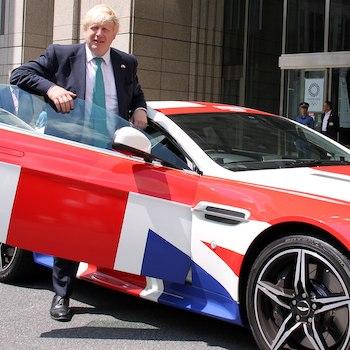The British Parliament is something to behold. And it's not just because of its storied history or the breathtaking neo-Gothic architecture of the Palace of Westminster.
It's because, when Parliament is in session, everything that Americans believe to be true of the British -- namely, that they are classier, more cultured, and smarter than we are -- is proven to be utter rubbish in the most uproariously hilarious way imaginable. When the cameras are rolling, British Members of Parliament relish in behaving like angry farm animals.
Hardly a statement is uttered by the Prime Minister or the Leader of the Opposition that isn't met with an approving chorus of, "Hear hear!" or a disapproving, "Naaaaaaay!" The Speaker of the House of Commons, who is non-partisan, plays the role of babysitter presiding officer and regularly intervenes to maintain order.
It is within this chaotic milieu that Boris Johnson, the new Prime Minister of the United Kingdom, gave his first speech to Parliament. And, much to our surprise, he gave a full-throated endorsement to GMOs.
 Boris Johnson: A Pro-GMO Leader in Europe
Boris Johnson: A Pro-GMO Leader in Europe
Mr. Johnson is controversial for many reasons, not least of which is his intention to take the UK out of the European Union, even if it means without a deal. (His perceived recklessness inspired an amusing cover for The Economist.) We take no position on the UK's domestic politics or "Brexit," but one potential benefit of the UK leaving the EU, mentioned by Mr. Johnson in his address, certainly caught our attention:
"Let's start now to liberate the UK's extraordinary bioscience sector from anti genetic modification rules; and let’s develop the blight-resistant crops that will feed the world."
That's music to our ears! And it's coming from a European, no less.
Mr. Johnson has a reputation for completely making things up, so it's quite possible that this will be yet another empty promise. But it's a curious one, since GMOs aren't all that popular in the UK. A poll in 2014 revealed that about 46% of Brits had negative feelings toward genetic modification (compared to 23% with a positive opinion). Interestingly, a 2018 poll showed that, among Millennial Brits aged 30 and under, two-thirds were in favor of agricultural technology. (It's the exact opposite in the US, where Millennials are more likely to be anti-GMO.)
Heigh-Ho, Heigh-Ho, Say Yes to GMO!
Believe it or not, these developments across the pond could have significant ramifications for U.S. farmers. The European Union has been extremely hostile to American agriculture, likely scuttling the possibility of a large trade deal. An article in Fortune explains:
"The EU has long opposed opening the way for more U.S. farm foods to come into the bloc. This is partly to protect Europe's small farmers from their larger U.S. competitors, and partly to keep out food that has been heavily genetically modified or—like chlorinated chicken—treated in ways that fall short of EU sanitary standards."
Basically, the EU -- led by countries like France -- is in some arenas staunchly protectionist, and its politicians use junk science to justify its ludicrous agricultural policy. (To put into perspective just how ludicrous the EU is on this issue, it allows the import of GMOs for animal feed.) There is also more than a hint of anti-Americanism in the continent's bizarre opposition to modern biotechnology.
If the UK leaves the EU, it will be free to import more American GMOs. Even if Brexit doesn't quite work out the way Mr. Johnson hopes, at least he may usher in a victory for science... and U.S. agriculture. Thanks, BoJo!




